Business and Corporate Law Case Study: Contract and Company Law
VerifiedAdded on 2023/01/05
|10
|2344
|26
Case Study
AI Summary
This document presents a comprehensive case study analysis of business and corporate law, addressing key legal issues related to contracts and company law. The first part of the case study examines a promotional competition run by SOO Burgers, focusing on whether the company has obligations to customers, Mickey and Brett, who attempted to claim a prize. The analysis delves into contract law principles, including offer, acceptance, and revocation, referencing relevant legal precedents like Carlill v Carbolic Smoke Ball Company and Byrne & Co v Leon Van Tien Hoven & Co. The second part of the case study focuses on Sparkling Pty Ltd, an incorporated company, and a loan agreement entered into by its managing director, Sarah. The analysis explores the legal implications of Sarah's actions, considering the company's constitution, the rule of Turquand, and relevant sections of the Corporations Act 2001 (Cth). The document assesses the obligations of the company and the bank, considering whether the loan is valid and whether the bank is protected by the rule of indoor management. The analysis covers whether the result will be distinct if the loan was taken to refurbish both the clothing shop of Sparkling, and if it was known to the loan officer of the bank that Sarah and Board are not in favour with each other and that Sarah was trying for a new job. Overall, the document provides a detailed application of legal principles to the facts of the case, offering clear conclusions on each issue.
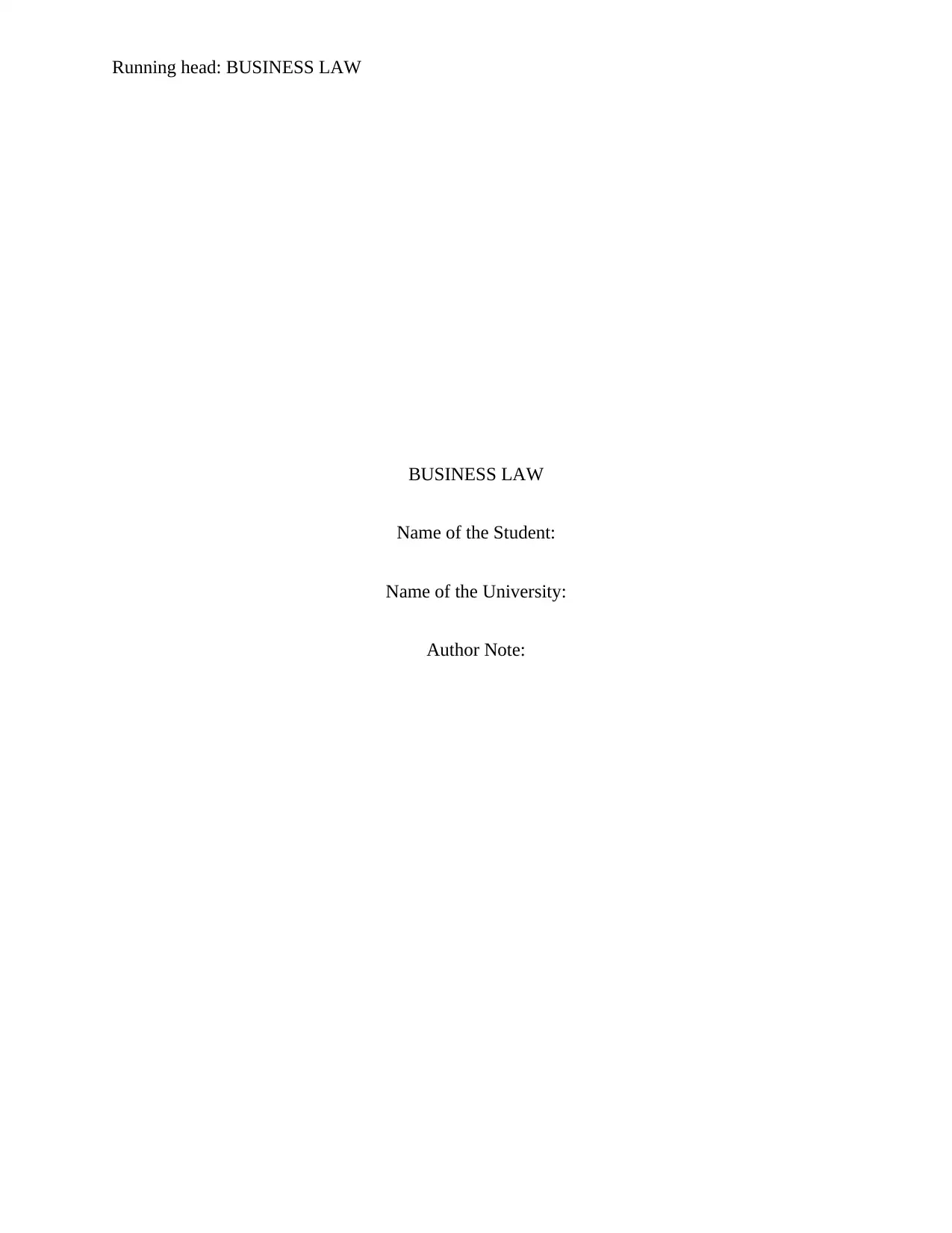
Running head: BUSINESS LAW
BUSINESS LAW
Name of the Student:
Name of the University:
Author Note:
BUSINESS LAW
Name of the Student:
Name of the University:
Author Note:
Paraphrase This Document
Need a fresh take? Get an instant paraphrase of this document with our AI Paraphraser
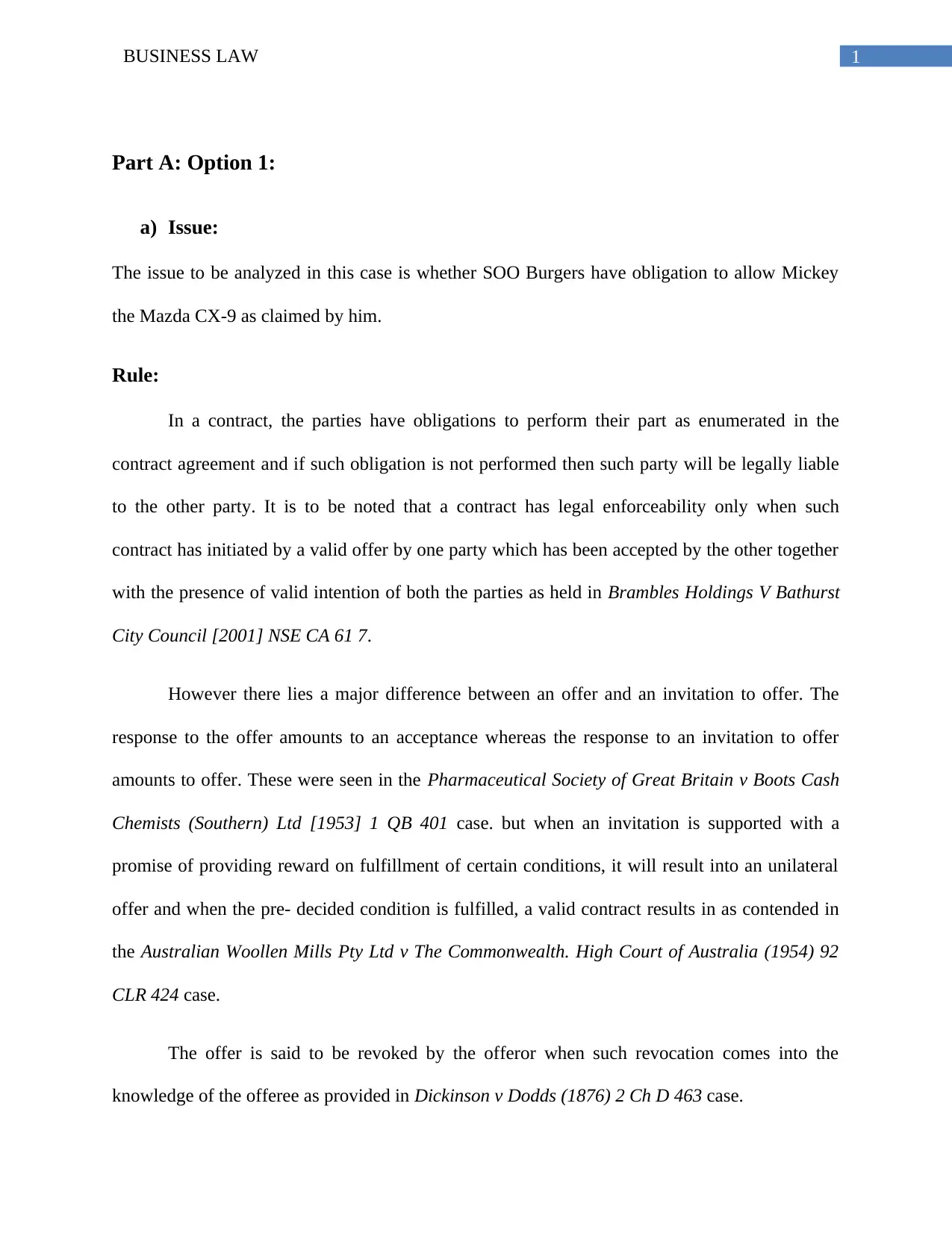
1BUSINESS LAW
Part A: Option 1:
a) Issue:
The issue to be analyzed in this case is whether SOO Burgers have obligation to allow Mickey
the Mazda CX-9 as claimed by him.
Rule:
In a contract, the parties have obligations to perform their part as enumerated in the
contract agreement and if such obligation is not performed then such party will be legally liable
to the other party. It is to be noted that a contract has legal enforceability only when such
contract has initiated by a valid offer by one party which has been accepted by the other together
with the presence of valid intention of both the parties as held in Brambles Holdings V Bathurst
City Council [2001] NSE CA 61 7.
However there lies a major difference between an offer and an invitation to offer. The
response to the offer amounts to an acceptance whereas the response to an invitation to offer
amounts to offer. These were seen in the Pharmaceutical Society of Great Britain v Boots Cash
Chemists (Southern) Ltd [1953] 1 QB 401 case. but when an invitation is supported with a
promise of providing reward on fulfillment of certain conditions, it will result into an unilateral
offer and when the pre- decided condition is fulfilled, a valid contract results in as contended in
the Australian Woollen Mills Pty Ltd v The Commonwealth. High Court of Australia (1954) 92
CLR 424 case.
The offer is said to be revoked by the offeror when such revocation comes into the
knowledge of the offeree as provided in Dickinson v Dodds (1876) 2 Ch D 463 case.
Part A: Option 1:
a) Issue:
The issue to be analyzed in this case is whether SOO Burgers have obligation to allow Mickey
the Mazda CX-9 as claimed by him.
Rule:
In a contract, the parties have obligations to perform their part as enumerated in the
contract agreement and if such obligation is not performed then such party will be legally liable
to the other party. It is to be noted that a contract has legal enforceability only when such
contract has initiated by a valid offer by one party which has been accepted by the other together
with the presence of valid intention of both the parties as held in Brambles Holdings V Bathurst
City Council [2001] NSE CA 61 7.
However there lies a major difference between an offer and an invitation to offer. The
response to the offer amounts to an acceptance whereas the response to an invitation to offer
amounts to offer. These were seen in the Pharmaceutical Society of Great Britain v Boots Cash
Chemists (Southern) Ltd [1953] 1 QB 401 case. but when an invitation is supported with a
promise of providing reward on fulfillment of certain conditions, it will result into an unilateral
offer and when the pre- decided condition is fulfilled, a valid contract results in as contended in
the Australian Woollen Mills Pty Ltd v The Commonwealth. High Court of Australia (1954) 92
CLR 424 case.
The offer is said to be revoked by the offeror when such revocation comes into the
knowledge of the offeree as provided in Dickinson v Dodds (1876) 2 Ch D 463 case.
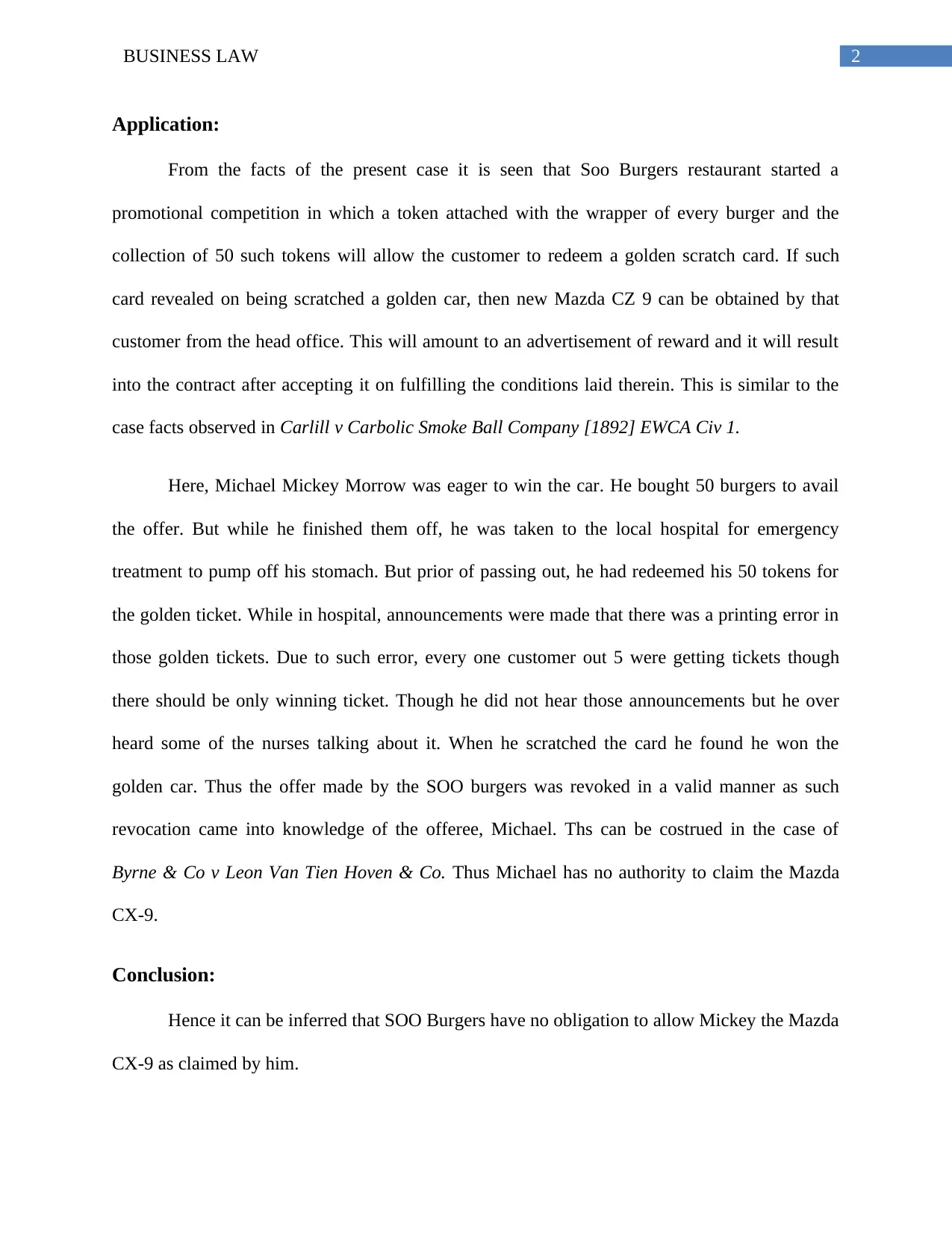
2BUSINESS LAW
Application:
From the facts of the present case it is seen that Soo Burgers restaurant started a
promotional competition in which a token attached with the wrapper of every burger and the
collection of 50 such tokens will allow the customer to redeem a golden scratch card. If such
card revealed on being scratched a golden car, then new Mazda CZ 9 can be obtained by that
customer from the head office. This will amount to an advertisement of reward and it will result
into the contract after accepting it on fulfilling the conditions laid therein. This is similar to the
case facts observed in Carlill v Carbolic Smoke Ball Company [1892] EWCA Civ 1.
Here, Michael Mickey Morrow was eager to win the car. He bought 50 burgers to avail
the offer. But while he finished them off, he was taken to the local hospital for emergency
treatment to pump off his stomach. But prior of passing out, he had redeemed his 50 tokens for
the golden ticket. While in hospital, announcements were made that there was a printing error in
those golden tickets. Due to such error, every one customer out 5 were getting tickets though
there should be only winning ticket. Though he did not hear those announcements but he over
heard some of the nurses talking about it. When he scratched the card he found he won the
golden car. Thus the offer made by the SOO burgers was revoked in a valid manner as such
revocation came into knowledge of the offeree, Michael. Ths can be costrued in the case of
Byrne & Co v Leon Van Tien Hoven & Co. Thus Michael has no authority to claim the Mazda
CX-9.
Conclusion:
Hence it can be inferred that SOO Burgers have no obligation to allow Mickey the Mazda
CX-9 as claimed by him.
Application:
From the facts of the present case it is seen that Soo Burgers restaurant started a
promotional competition in which a token attached with the wrapper of every burger and the
collection of 50 such tokens will allow the customer to redeem a golden scratch card. If such
card revealed on being scratched a golden car, then new Mazda CZ 9 can be obtained by that
customer from the head office. This will amount to an advertisement of reward and it will result
into the contract after accepting it on fulfilling the conditions laid therein. This is similar to the
case facts observed in Carlill v Carbolic Smoke Ball Company [1892] EWCA Civ 1.
Here, Michael Mickey Morrow was eager to win the car. He bought 50 burgers to avail
the offer. But while he finished them off, he was taken to the local hospital for emergency
treatment to pump off his stomach. But prior of passing out, he had redeemed his 50 tokens for
the golden ticket. While in hospital, announcements were made that there was a printing error in
those golden tickets. Due to such error, every one customer out 5 were getting tickets though
there should be only winning ticket. Though he did not hear those announcements but he over
heard some of the nurses talking about it. When he scratched the card he found he won the
golden car. Thus the offer made by the SOO burgers was revoked in a valid manner as such
revocation came into knowledge of the offeree, Michael. Ths can be costrued in the case of
Byrne & Co v Leon Van Tien Hoven & Co. Thus Michael has no authority to claim the Mazda
CX-9.
Conclusion:
Hence it can be inferred that SOO Burgers have no obligation to allow Mickey the Mazda
CX-9 as claimed by him.
⊘ This is a preview!⊘
Do you want full access?
Subscribe today to unlock all pages.

Trusted by 1+ million students worldwide
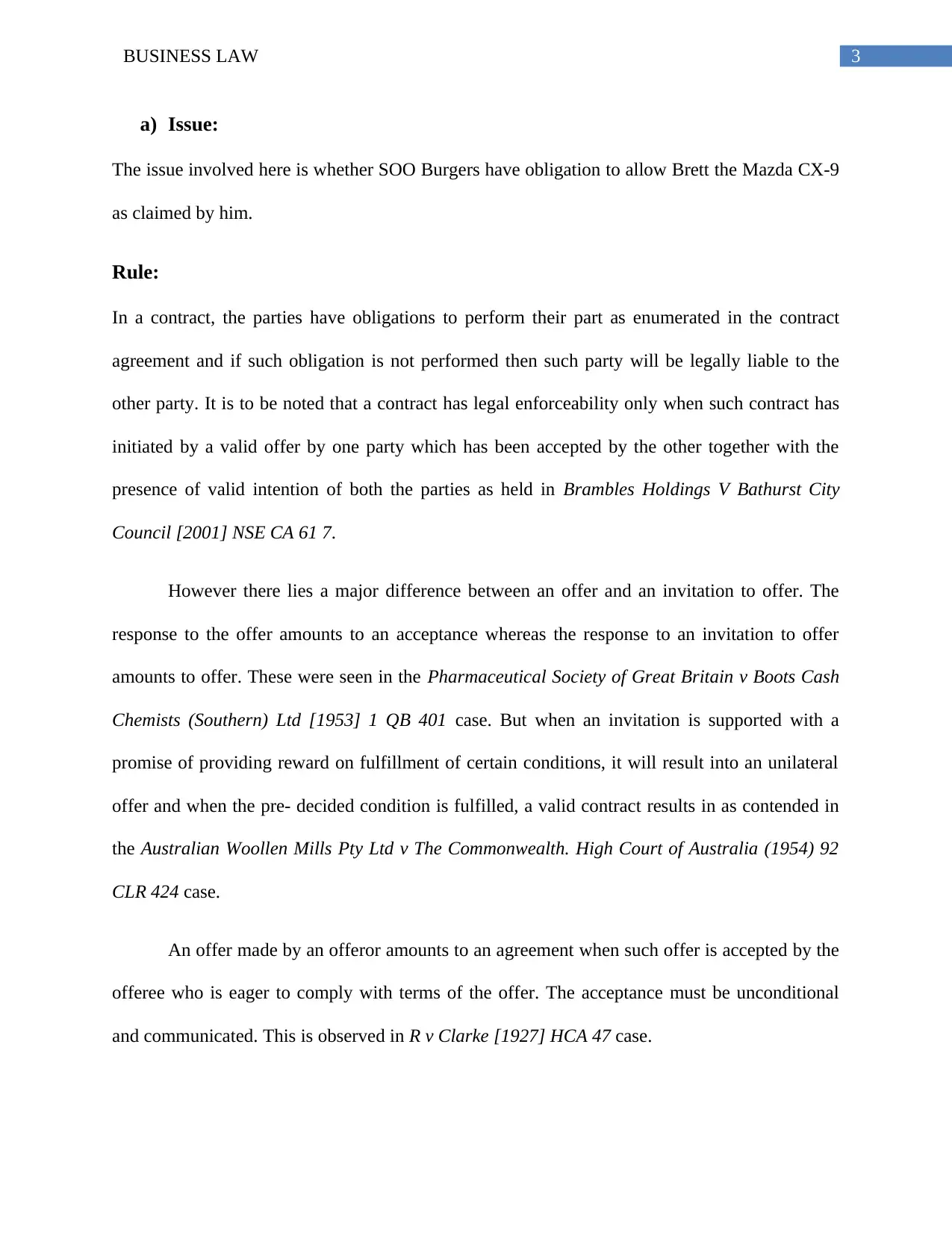
3BUSINESS LAW
a) Issue:
The issue involved here is whether SOO Burgers have obligation to allow Brett the Mazda CX-9
as claimed by him.
Rule:
In a contract, the parties have obligations to perform their part as enumerated in the contract
agreement and if such obligation is not performed then such party will be legally liable to the
other party. It is to be noted that a contract has legal enforceability only when such contract has
initiated by a valid offer by one party which has been accepted by the other together with the
presence of valid intention of both the parties as held in Brambles Holdings V Bathurst City
Council [2001] NSE CA 61 7.
However there lies a major difference between an offer and an invitation to offer. The
response to the offer amounts to an acceptance whereas the response to an invitation to offer
amounts to offer. These were seen in the Pharmaceutical Society of Great Britain v Boots Cash
Chemists (Southern) Ltd [1953] 1 QB 401 case. But when an invitation is supported with a
promise of providing reward on fulfillment of certain conditions, it will result into an unilateral
offer and when the pre- decided condition is fulfilled, a valid contract results in as contended in
the Australian Woollen Mills Pty Ltd v The Commonwealth. High Court of Australia (1954) 92
CLR 424 case.
An offer made by an offeror amounts to an agreement when such offer is accepted by the
offeree who is eager to comply with terms of the offer. The acceptance must be unconditional
and communicated. This is observed in R v Clarke [1927] HCA 47 case.
a) Issue:
The issue involved here is whether SOO Burgers have obligation to allow Brett the Mazda CX-9
as claimed by him.
Rule:
In a contract, the parties have obligations to perform their part as enumerated in the contract
agreement and if such obligation is not performed then such party will be legally liable to the
other party. It is to be noted that a contract has legal enforceability only when such contract has
initiated by a valid offer by one party which has been accepted by the other together with the
presence of valid intention of both the parties as held in Brambles Holdings V Bathurst City
Council [2001] NSE CA 61 7.
However there lies a major difference between an offer and an invitation to offer. The
response to the offer amounts to an acceptance whereas the response to an invitation to offer
amounts to offer. These were seen in the Pharmaceutical Society of Great Britain v Boots Cash
Chemists (Southern) Ltd [1953] 1 QB 401 case. But when an invitation is supported with a
promise of providing reward on fulfillment of certain conditions, it will result into an unilateral
offer and when the pre- decided condition is fulfilled, a valid contract results in as contended in
the Australian Woollen Mills Pty Ltd v The Commonwealth. High Court of Australia (1954) 92
CLR 424 case.
An offer made by an offeror amounts to an agreement when such offer is accepted by the
offeree who is eager to comply with terms of the offer. The acceptance must be unconditional
and communicated. This is observed in R v Clarke [1927] HCA 47 case.
Paraphrase This Document
Need a fresh take? Get an instant paraphrase of this document with our AI Paraphraser
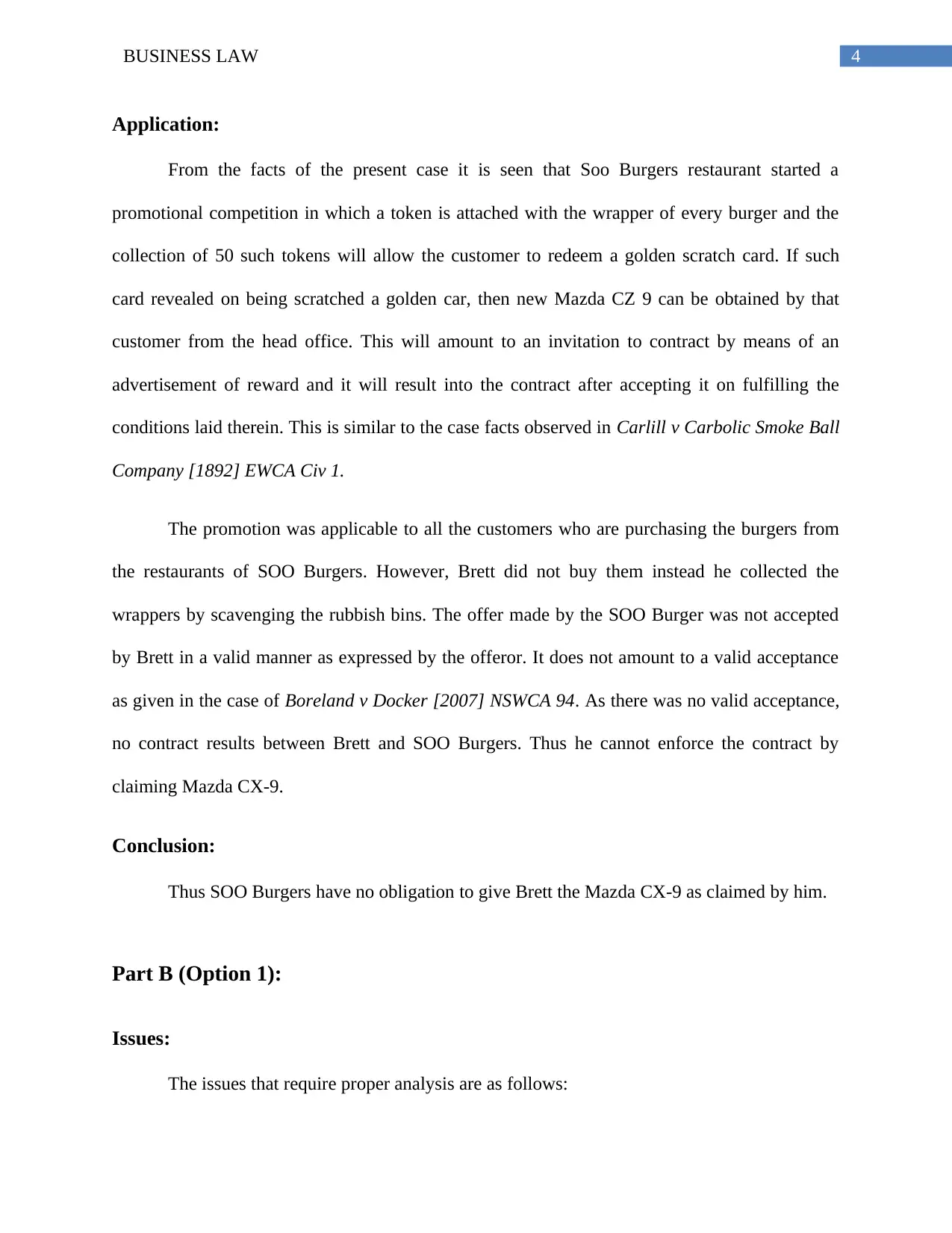
4BUSINESS LAW
Application:
From the facts of the present case it is seen that Soo Burgers restaurant started a
promotional competition in which a token is attached with the wrapper of every burger and the
collection of 50 such tokens will allow the customer to redeem a golden scratch card. If such
card revealed on being scratched a golden car, then new Mazda CZ 9 can be obtained by that
customer from the head office. This will amount to an invitation to contract by means of an
advertisement of reward and it will result into the contract after accepting it on fulfilling the
conditions laid therein. This is similar to the case facts observed in Carlill v Carbolic Smoke Ball
Company [1892] EWCA Civ 1.
The promotion was applicable to all the customers who are purchasing the burgers from
the restaurants of SOO Burgers. However, Brett did not buy them instead he collected the
wrappers by scavenging the rubbish bins. The offer made by the SOO Burger was not accepted
by Brett in a valid manner as expressed by the offeror. It does not amount to a valid acceptance
as given in the case of Boreland v Docker [2007] NSWCA 94. As there was no valid acceptance,
no contract results between Brett and SOO Burgers. Thus he cannot enforce the contract by
claiming Mazda CX-9.
Conclusion:
Thus SOO Burgers have no obligation to give Brett the Mazda CX-9 as claimed by him.
Part B (Option 1):
Issues:
The issues that require proper analysis are as follows:
Application:
From the facts of the present case it is seen that Soo Burgers restaurant started a
promotional competition in which a token is attached with the wrapper of every burger and the
collection of 50 such tokens will allow the customer to redeem a golden scratch card. If such
card revealed on being scratched a golden car, then new Mazda CZ 9 can be obtained by that
customer from the head office. This will amount to an invitation to contract by means of an
advertisement of reward and it will result into the contract after accepting it on fulfilling the
conditions laid therein. This is similar to the case facts observed in Carlill v Carbolic Smoke Ball
Company [1892] EWCA Civ 1.
The promotion was applicable to all the customers who are purchasing the burgers from
the restaurants of SOO Burgers. However, Brett did not buy them instead he collected the
wrappers by scavenging the rubbish bins. The offer made by the SOO Burger was not accepted
by Brett in a valid manner as expressed by the offeror. It does not amount to a valid acceptance
as given in the case of Boreland v Docker [2007] NSWCA 94. As there was no valid acceptance,
no contract results between Brett and SOO Burgers. Thus he cannot enforce the contract by
claiming Mazda CX-9.
Conclusion:
Thus SOO Burgers have no obligation to give Brett the Mazda CX-9 as claimed by him.
Part B (Option 1):
Issues:
The issues that require proper analysis are as follows:
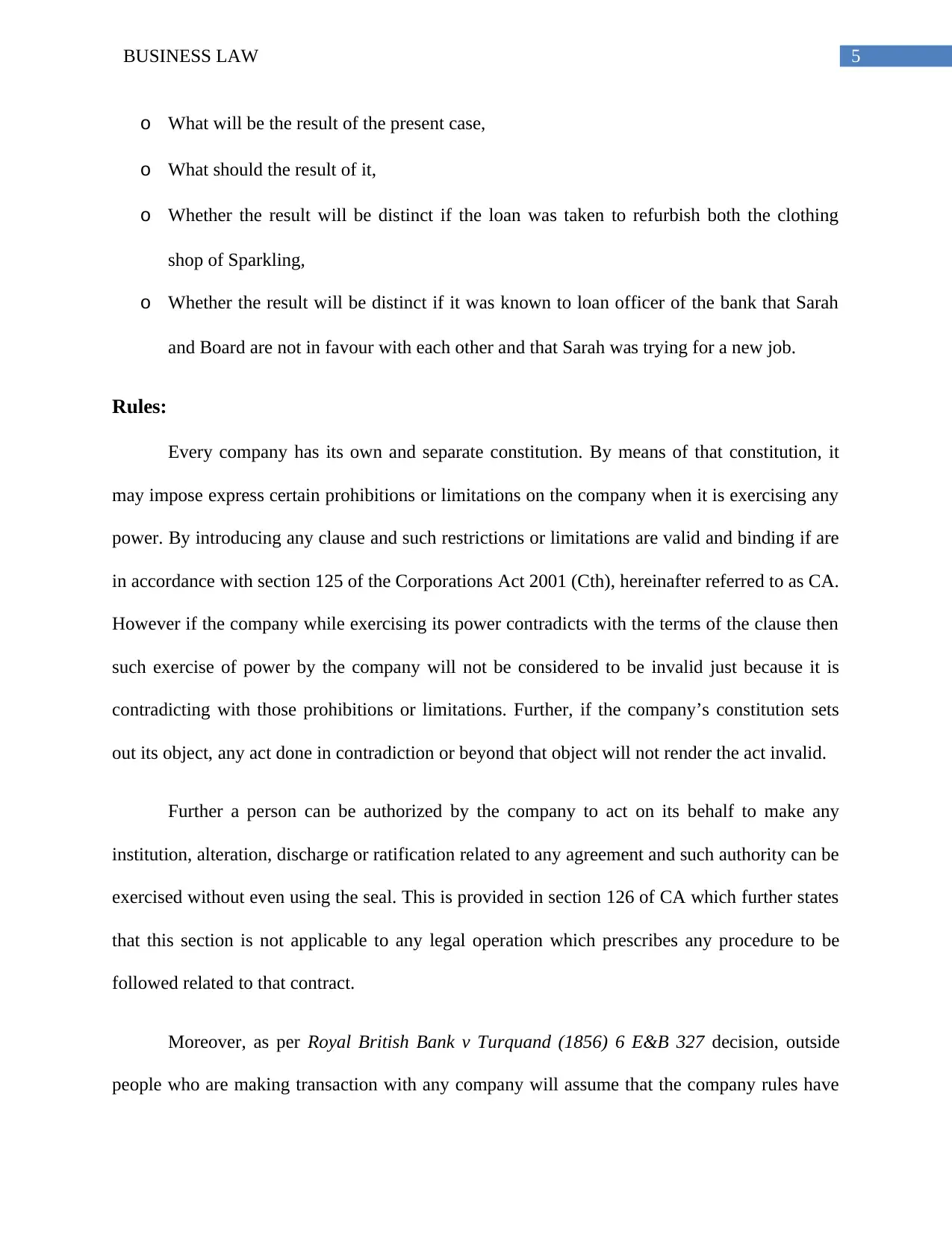
5BUSINESS LAW
o What will be the result of the present case,
o What should the result of it,
o Whether the result will be distinct if the loan was taken to refurbish both the clothing
shop of Sparkling,
o Whether the result will be distinct if it was known to loan officer of the bank that Sarah
and Board are not in favour with each other and that Sarah was trying for a new job.
Rules:
Every company has its own and separate constitution. By means of that constitution, it
may impose express certain prohibitions or limitations on the company when it is exercising any
power. By introducing any clause and such restrictions or limitations are valid and binding if are
in accordance with section 125 of the Corporations Act 2001 (Cth), hereinafter referred to as CA.
However if the company while exercising its power contradicts with the terms of the clause then
such exercise of power by the company will not be considered to be invalid just because it is
contradicting with those prohibitions or limitations. Further, if the company’s constitution sets
out its object, any act done in contradiction or beyond that object will not render the act invalid.
Further a person can be authorized by the company to act on its behalf to make any
institution, alteration, discharge or ratification related to any agreement and such authority can be
exercised without even using the seal. This is provided in section 126 of CA which further states
that this section is not applicable to any legal operation which prescribes any procedure to be
followed related to that contract.
Moreover, as per Royal British Bank v Turquand (1856) 6 E&B 327 decision, outside
people who are making transaction with any company will assume that the company rules have
o What will be the result of the present case,
o What should the result of it,
o Whether the result will be distinct if the loan was taken to refurbish both the clothing
shop of Sparkling,
o Whether the result will be distinct if it was known to loan officer of the bank that Sarah
and Board are not in favour with each other and that Sarah was trying for a new job.
Rules:
Every company has its own and separate constitution. By means of that constitution, it
may impose express certain prohibitions or limitations on the company when it is exercising any
power. By introducing any clause and such restrictions or limitations are valid and binding if are
in accordance with section 125 of the Corporations Act 2001 (Cth), hereinafter referred to as CA.
However if the company while exercising its power contradicts with the terms of the clause then
such exercise of power by the company will not be considered to be invalid just because it is
contradicting with those prohibitions or limitations. Further, if the company’s constitution sets
out its object, any act done in contradiction or beyond that object will not render the act invalid.
Further a person can be authorized by the company to act on its behalf to make any
institution, alteration, discharge or ratification related to any agreement and such authority can be
exercised without even using the seal. This is provided in section 126 of CA which further states
that this section is not applicable to any legal operation which prescribes any procedure to be
followed related to that contract.
Moreover, as per Royal British Bank v Turquand (1856) 6 E&B 327 decision, outside
people who are making transaction with any company will assume that the company rules have
⊘ This is a preview!⊘
Do you want full access?
Subscribe today to unlock all pages.

Trusted by 1+ million students worldwide
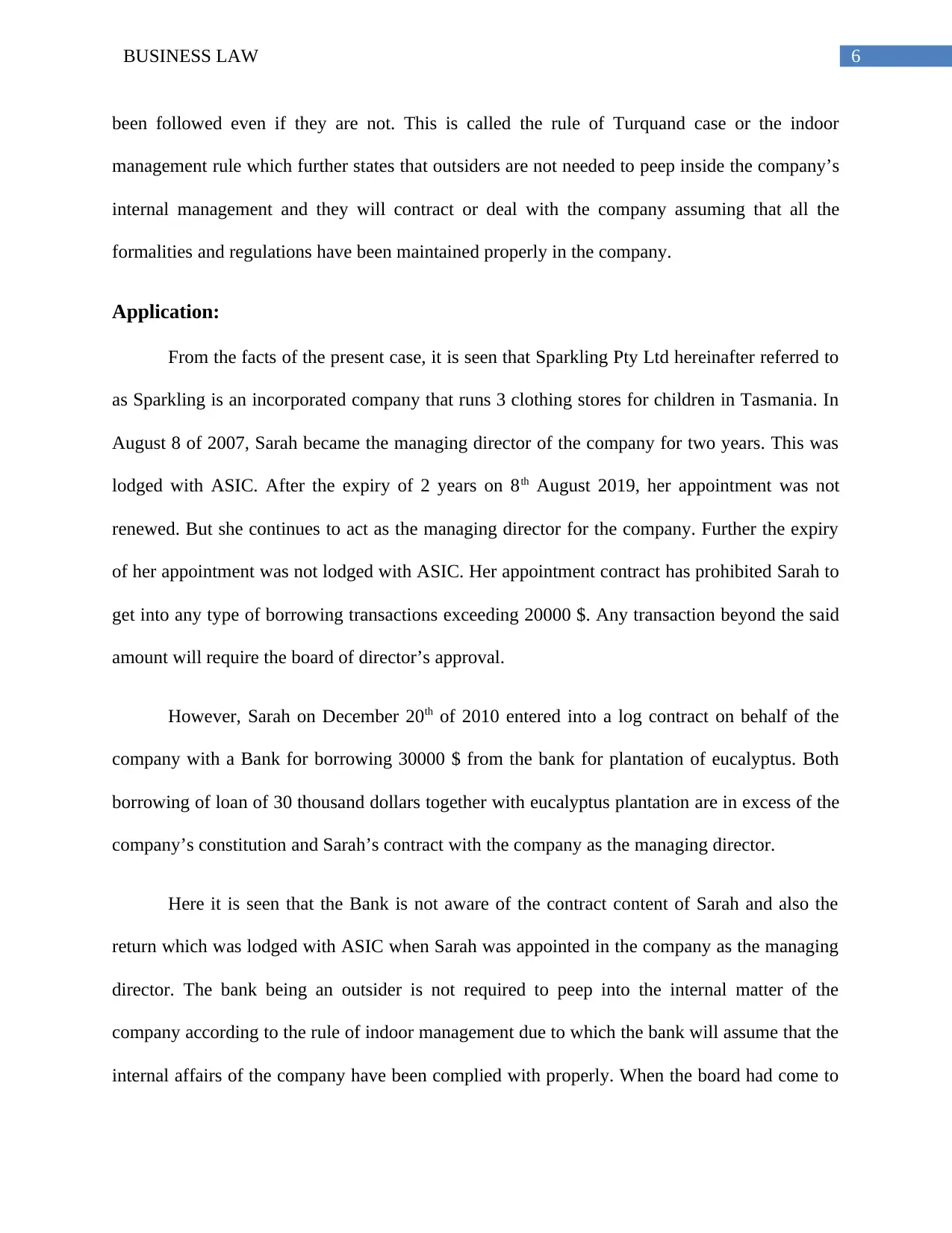
6BUSINESS LAW
been followed even if they are not. This is called the rule of Turquand case or the indoor
management rule which further states that outsiders are not needed to peep inside the company’s
internal management and they will contract or deal with the company assuming that all the
formalities and regulations have been maintained properly in the company.
Application:
From the facts of the present case, it is seen that Sparkling Pty Ltd hereinafter referred to
as Sparkling is an incorporated company that runs 3 clothing stores for children in Tasmania. In
August 8 of 2007, Sarah became the managing director of the company for two years. This was
lodged with ASIC. After the expiry of 2 years on 8th August 2019, her appointment was not
renewed. But she continues to act as the managing director for the company. Further the expiry
of her appointment was not lodged with ASIC. Her appointment contract has prohibited Sarah to
get into any type of borrowing transactions exceeding 20000 $. Any transaction beyond the said
amount will require the board of director’s approval.
However, Sarah on December 20th of 2010 entered into a log contract on behalf of the
company with a Bank for borrowing 30000 $ from the bank for plantation of eucalyptus. Both
borrowing of loan of 30 thousand dollars together with eucalyptus plantation are in excess of the
company’s constitution and Sarah’s contract with the company as the managing director.
Here it is seen that the Bank is not aware of the contract content of Sarah and also the
return which was lodged with ASIC when Sarah was appointed in the company as the managing
director. The bank being an outsider is not required to peep into the internal matter of the
company according to the rule of indoor management due to which the bank will assume that the
internal affairs of the company have been complied with properly. When the board had come to
been followed even if they are not. This is called the rule of Turquand case or the indoor
management rule which further states that outsiders are not needed to peep inside the company’s
internal management and they will contract or deal with the company assuming that all the
formalities and regulations have been maintained properly in the company.
Application:
From the facts of the present case, it is seen that Sparkling Pty Ltd hereinafter referred to
as Sparkling is an incorporated company that runs 3 clothing stores for children in Tasmania. In
August 8 of 2007, Sarah became the managing director of the company for two years. This was
lodged with ASIC. After the expiry of 2 years on 8th August 2019, her appointment was not
renewed. But she continues to act as the managing director for the company. Further the expiry
of her appointment was not lodged with ASIC. Her appointment contract has prohibited Sarah to
get into any type of borrowing transactions exceeding 20000 $. Any transaction beyond the said
amount will require the board of director’s approval.
However, Sarah on December 20th of 2010 entered into a log contract on behalf of the
company with a Bank for borrowing 30000 $ from the bank for plantation of eucalyptus. Both
borrowing of loan of 30 thousand dollars together with eucalyptus plantation are in excess of the
company’s constitution and Sarah’s contract with the company as the managing director.
Here it is seen that the Bank is not aware of the contract content of Sarah and also the
return which was lodged with ASIC when Sarah was appointed in the company as the managing
director. The bank being an outsider is not required to peep into the internal matter of the
company according to the rule of indoor management due to which the bank will assume that the
internal affairs of the company have been complied with properly. When the board had come to
Paraphrase This Document
Need a fresh take? Get an instant paraphrase of this document with our AI Paraphraser
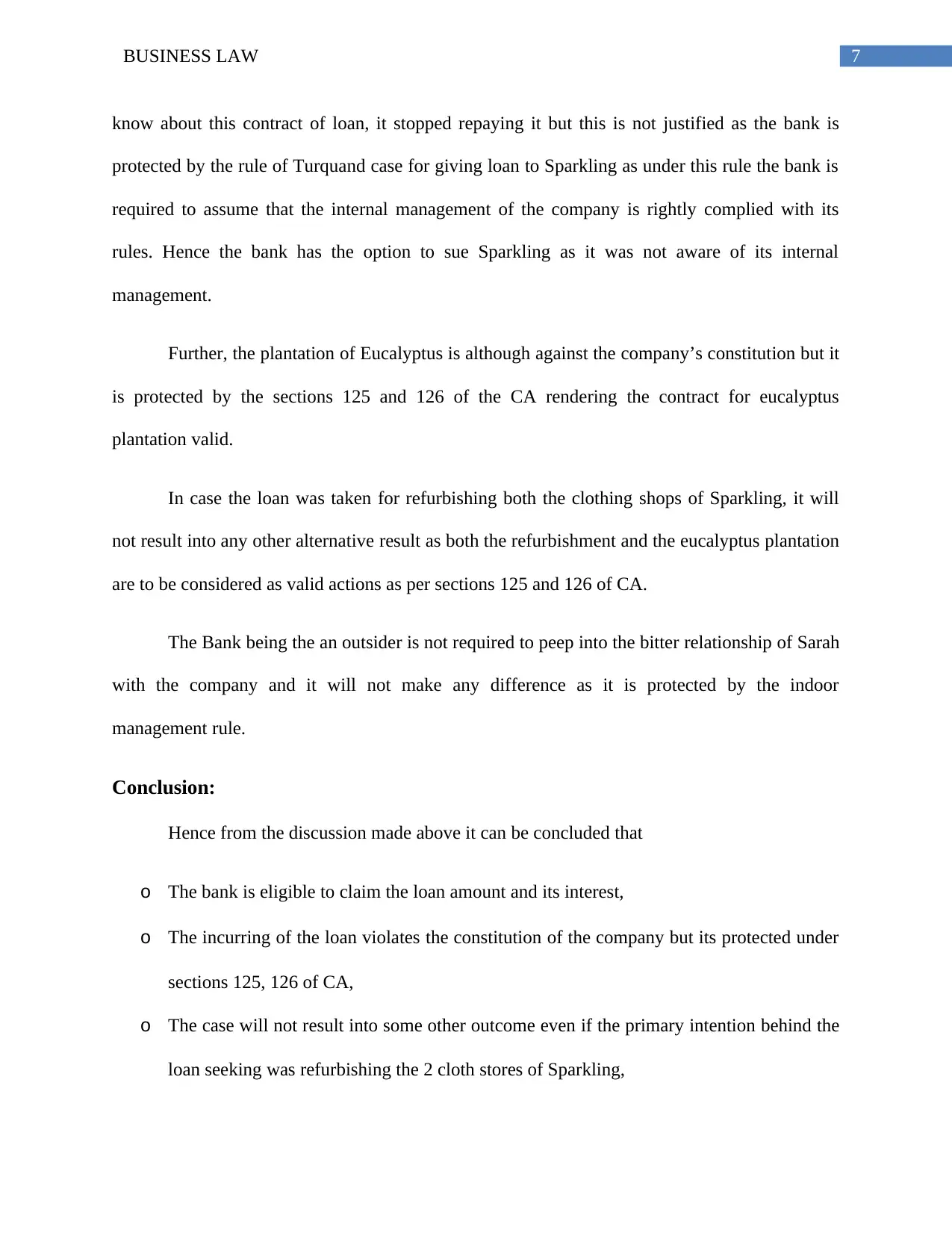
7BUSINESS LAW
know about this contract of loan, it stopped repaying it but this is not justified as the bank is
protected by the rule of Turquand case for giving loan to Sparkling as under this rule the bank is
required to assume that the internal management of the company is rightly complied with its
rules. Hence the bank has the option to sue Sparkling as it was not aware of its internal
management.
Further, the plantation of Eucalyptus is although against the company’s constitution but it
is protected by the sections 125 and 126 of the CA rendering the contract for eucalyptus
plantation valid.
In case the loan was taken for refurbishing both the clothing shops of Sparkling, it will
not result into any other alternative result as both the refurbishment and the eucalyptus plantation
are to be considered as valid actions as per sections 125 and 126 of CA.
The Bank being the an outsider is not required to peep into the bitter relationship of Sarah
with the company and it will not make any difference as it is protected by the indoor
management rule.
Conclusion:
Hence from the discussion made above it can be concluded that
o The bank is eligible to claim the loan amount and its interest,
o The incurring of the loan violates the constitution of the company but its protected under
sections 125, 126 of CA,
o The case will not result into some other outcome even if the primary intention behind the
loan seeking was refurbishing the 2 cloth stores of Sparkling,
know about this contract of loan, it stopped repaying it but this is not justified as the bank is
protected by the rule of Turquand case for giving loan to Sparkling as under this rule the bank is
required to assume that the internal management of the company is rightly complied with its
rules. Hence the bank has the option to sue Sparkling as it was not aware of its internal
management.
Further, the plantation of Eucalyptus is although against the company’s constitution but it
is protected by the sections 125 and 126 of the CA rendering the contract for eucalyptus
plantation valid.
In case the loan was taken for refurbishing both the clothing shops of Sparkling, it will
not result into any other alternative result as both the refurbishment and the eucalyptus plantation
are to be considered as valid actions as per sections 125 and 126 of CA.
The Bank being the an outsider is not required to peep into the bitter relationship of Sarah
with the company and it will not make any difference as it is protected by the indoor
management rule.
Conclusion:
Hence from the discussion made above it can be concluded that
o The bank is eligible to claim the loan amount and its interest,
o The incurring of the loan violates the constitution of the company but its protected under
sections 125, 126 of CA,
o The case will not result into some other outcome even if the primary intention behind the
loan seeking was refurbishing the 2 cloth stores of Sparkling,
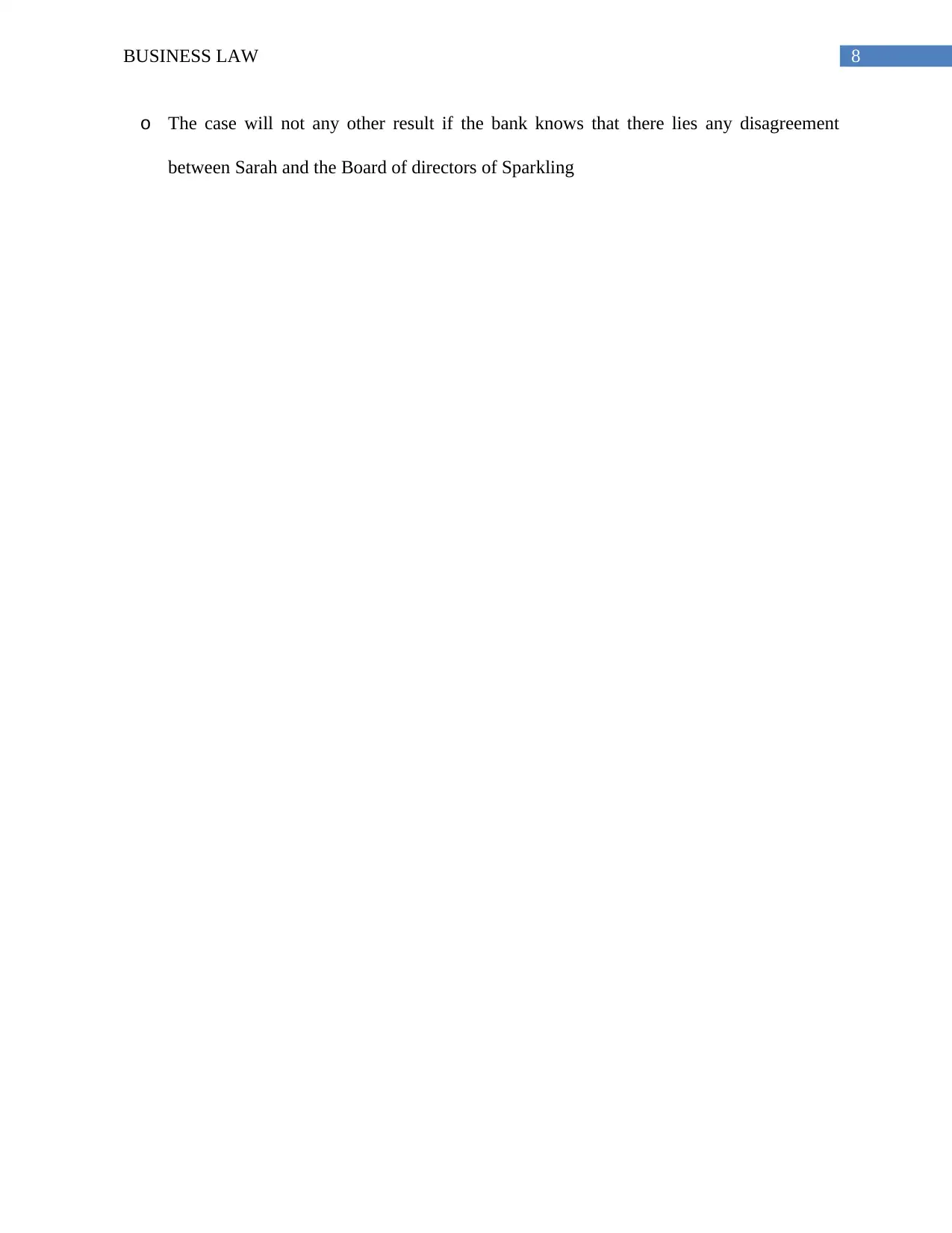
8BUSINESS LAW
o The case will not any other result if the bank knows that there lies any disagreement
between Sarah and the Board of directors of Sparkling
o The case will not any other result if the bank knows that there lies any disagreement
between Sarah and the Board of directors of Sparkling
⊘ This is a preview!⊘
Do you want full access?
Subscribe today to unlock all pages.

Trusted by 1+ million students worldwide
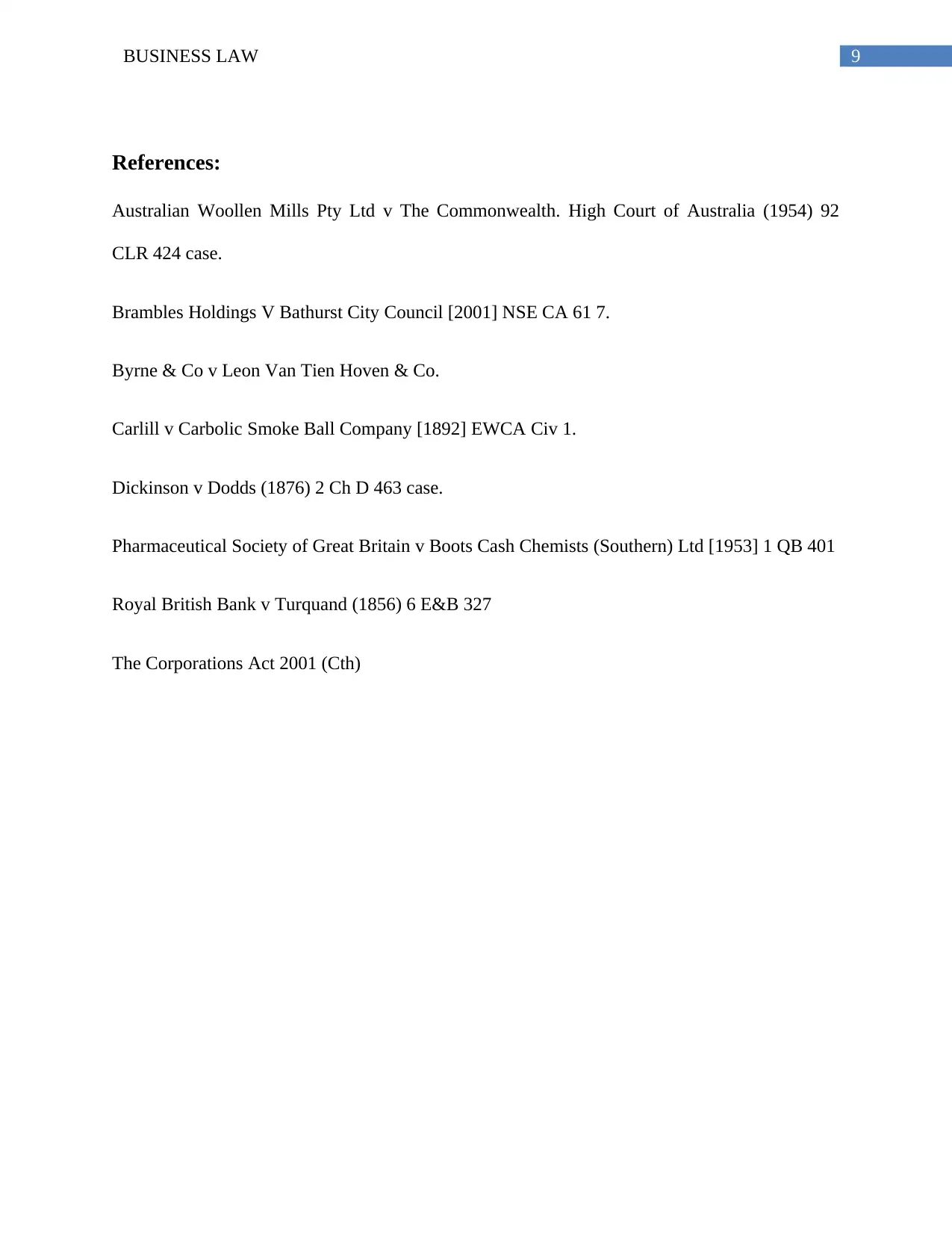
9BUSINESS LAW
References:
Australian Woollen Mills Pty Ltd v The Commonwealth. High Court of Australia (1954) 92
CLR 424 case.
Brambles Holdings V Bathurst City Council [2001] NSE CA 61 7.
Byrne & Co v Leon Van Tien Hoven & Co.
Carlill v Carbolic Smoke Ball Company [1892] EWCA Civ 1.
Dickinson v Dodds (1876) 2 Ch D 463 case.
Pharmaceutical Society of Great Britain v Boots Cash Chemists (Southern) Ltd [1953] 1 QB 401
Royal British Bank v Turquand (1856) 6 E&B 327
The Corporations Act 2001 (Cth)
References:
Australian Woollen Mills Pty Ltd v The Commonwealth. High Court of Australia (1954) 92
CLR 424 case.
Brambles Holdings V Bathurst City Council [2001] NSE CA 61 7.
Byrne & Co v Leon Van Tien Hoven & Co.
Carlill v Carbolic Smoke Ball Company [1892] EWCA Civ 1.
Dickinson v Dodds (1876) 2 Ch D 463 case.
Pharmaceutical Society of Great Britain v Boots Cash Chemists (Southern) Ltd [1953] 1 QB 401
Royal British Bank v Turquand (1856) 6 E&B 327
The Corporations Act 2001 (Cth)
1 out of 10
Related Documents
Your All-in-One AI-Powered Toolkit for Academic Success.
+13062052269
info@desklib.com
Available 24*7 on WhatsApp / Email
![[object Object]](/_next/static/media/star-bottom.7253800d.svg)
Unlock your academic potential
Copyright © 2020–2026 A2Z Services. All Rights Reserved. Developed and managed by ZUCOL.





